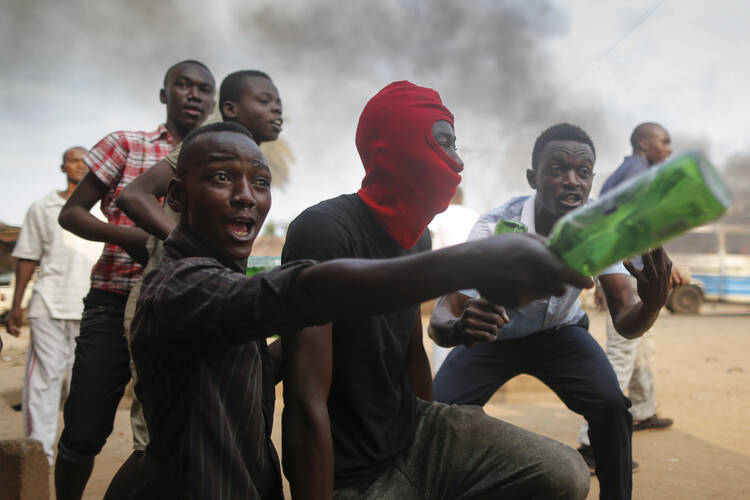A Catholic aid official in Burundi said he believes "outright conflict" could still be avoided if the East African country's rulers heed church appeals for dialogue and compromise.
In early November, the U.N. Security Council discussed Burundi's worsening violence, sparked by President Pierre Nkurunziza's acceptance of a third term in apparent violation of the constitution.
Darren Posey, country representative of the Baltimore-based Catholic Relief Services, called the situation "very fluid, but we're hoping some process will be found to avoid worse violence and enable the opposing parties to find common ground."
"Although periodic shootings and house-to-house searches have caused considerable tension, things are now relatively peaceful, and we're not seeing a lot of displacements," he told Catholic News Service on Nov. 9, the day the local church launched a novena of prayer for peace.
He said although security forces were pressuring people not to leave their homes, "many have fled the areas targeted for sweeps, in some cases heading upcountry."
"Although the work of agencies like ours has continued, this is a stressful period for staffers, many of whom have families in the capital, Bujumbura, and other affected towns. We must hope calls for dialogue are now taken up," he said.
At least 200 people have been killed in clashes since the April decision by Nkurunziza to run for a third term. He was re-elected in July with 70 percent of votes in an election boycotted by the opposition.
Some fear a resurgence of the 1993-2006 civil war, which left at last 250,000 dead. U.S. President Barack Obama announced Oct. 30 the withdrawal of Burundi's status as "privileged commercial partner," citing "assassinations, arbitrary detentions and cases of torture" since Nkurunziza's re-election.
France's Catholic La Croix daily reported Nov. 6 the president of Burundi's senate, Reverien Ndikuriyo, had threatened to "pulverize" pro-opposition areas of Bujumbura and "send the police to work." News media reported government troops began a crackdown in pro-opposition areas of the country after a Nov. 7 presidential deadline for the handover of weapons.
Posey told CNS Nkurunziza's government had launched an "intra-Burundian dialogue" in apparent readiness to "hear different viewpoints." He said he believed the government could still heed the church's call for reconciliation, adding that the bishops had appointed a senior priest to participate in its new dialogue forum.
However, he also said the president had used "unhelpful language" in hard-line statements. He added that Burundians had been encouraged by the concern expressed by U.S., European and African Union officials, but said the closure of media outlets and flight of journalists had made it hard to obtain "clear, analytical information."
Earlier in the year, the Burundian bishops' conference repeatedly encouraged people to vote, despite what it described as difficulties surrounding the process.
In a Sept. 16 pastoral message, the bishops said their church stood ready to help re-establish peace and security, despite deep divisions over the election outcome, at a time when people were being "savagely assassinated" or "imprisoned through simple suspicion," and "new rebel groups" were forming.
"Our country is being plunged into terrifying poverty, and ethnic, regional and religious divisions -- unless we are careful, it risks becoming accustomed to a climate of murders and fear of war," the message said. "True security and lasting peace will only come at the price of accepting dialogue. If people come together and listen to each other in mutual respect, placing the good of the nation and all its citizens in first place, a good solution may still be found."
Posey told CNS that although there was tension after the bishops' September statement, "several meetings have now taken place, and church-government relations are improving -- Catholics in general aren't being targeted or threatened."
"There's a united sense that, while there were real problems with the electoral process, the only peaceful solution lies in dialogue between conflicting parties. Although this has to be handled by Burundians themselves, we've offered our help and support," he said.








